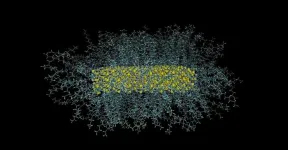(Press-News.org) DAEJEON, South Korea (October 14, 2024) – Qunova Computing, a developer of quantum software applications designed to bring quantum computing to the chemical, pharmaceutical and industrial engineering industries, today announces the results from a series of recent tests performed on three different NISQ era quantum computers, each with a different qubit count. In each demonstration, Qunova’s algorithm was able to produce results with accuracy below the threshold of 1.6 millihartrees required for real-world quantum chemistry applications, a level known as ‘chemical accuracy’. This marks the first time this has been achieved on a commercially available device.
“This is a very exciting result for our team, and indeed for the quantum computing community more broadly” said June-Koo Kevin Rhee, CEO and Founder of Qunova Computing. “These results show that we are able to meet the requirements of industrial users on existing NISQ machines. We anticipate that running a similar demonstration on a NISQ machine with as few as 40-qubits could provide industrial users with a real quantum advantage. To that end, our team will spend the coming months preparing experiments to confirm if this theory is correct.”
During the Quantum Korea 2024 event, Qunova demonstrated chemical accuracy using a 20 qubit IQM machine. This demonstration was performed successfully 3 days in a row, to produce energy estimations of three different geometries of lithium sulfide (Li2S) for an hour each day, live at the event. Previous to that, in a 24-qubit experiment using an IBM Quantum Eagle processor, Qunova also demonstrated its algorithm can reach a computational accuracy of 0.1 millihartrees in modeling the ground state energy of lithium sulfide, which is well beyond what is required for chemical accuracy. The company has also recently achieved comparable results using the IBEX Q1 quantum computer, an ion-based machine from AQT which supports up to 20 qubits.
These results indicate that the quantum algorithm Qunova has developed is hardware-agnostic. These tests were conducted on a range of different molecules including lithium sulfide, hydrogen sulfide, water and methane.
“The results Qunova has demonstrated mark a significant milestone for end-users aiming to use quantum hardware for applications in the field of chemistry. IQM is pleased to have supplied the hardware on which this demonstration was run repeatedly, over multiple days, during this summer’s Quantum Korea event. Our commercial quantum system ran reliably and, together with Qunova’s advanced algorithm, demonstrated that we are now entering the era when quantum computing can deliver real value for users in the form of new business applications,” said Dr. Peter Eder, Head of Strategic Partnerships at IQM Quantum Computers.
"At AQT, our aim is to solve challenges beyond classical computing capabilities, pushing boundaries to address business needs. Providing quantum hardware on which Qunova was able to achieve chemical accuracy is an excellent example of the kind of value we aim to deliver with our partners. The results from this experiment, using our 20-qubit trapped-ion system, show that Qunova’s solution is truly hardware agnostic, which is an impressive achievement. Through our cloud solution, ARNICA, we remain committed to accelerating quantum discovery and making this transformative technology readily available,” added Dr. Thomas Monz, CEO at AQT.
Unlike simulations done on classical computers using traditional Variational Quantum Eigensolvers (VQEs), which are not scalable, the Qunova solution functions on all types of quantum computers and provides computational accuracy sufficient to carry out advanced computations for chemistry. Meanwhile VQEs run on quantum systems have thus far failed to achieve chemical accuracy. Qunova has achieved this using its new kind of simplified VQE, dubbed “HiVQE” or “Handover Iteration VQE”.
The results show that using this HiVQE solution reduces the computational resources required to compute these problems by 1,000 times or more, when compared with traditional VQEs. Qunova therefore estimates that its algorithm has the potential to deliver a quantum advantage for chemical computations, over classical computers, using a NISQ machine with as few as 40-60 qubits.
The key to this breakthrough was to develop a computational method without carrying over errors in the quantum computing procedure. “Pauli word measurements” were therefore removed from the traditional VQE algorithm to simplify problems and harvest only essential data related to the orbitals of each molecule. Then, those outcomes were fed into classical machines to calculate the result with the lowest energy very quickly, which allows chemical accuracy to be achieved. This also enabled the computations to run 1,000x more efficiently.
About Qunova Computing
Founded in 2021, Qunova Computing builds quantum algorithms for the chemical and pharmaceutical industries. These algorithms have been tested with leading quantum hardware companies, and results indicate Qunova will deliver a quantum advantage for users, even using Noisy Intermediate Scale Quantum computers (NISQ). By using a hybrid approach including algorithms which provide a far greater level of accuracy, the company will soon unlock the tremendous potential of quantum computing for the chemical sector by slashing the costly and lengthy process required to develop new materials with specific properties. This will allow users to significantly reduce the time and expenses related to their R&D processes, enabling them to bring new products to market more quickly and at a lower cost. For additional insight into our groundbreaking work, please visit qunovacomputing.com.
Media Contact
Steve La Barbera
FTG Media
Click to email
647-715-1774
END
Qunova becomes first to achieve ‘chemical accuracy’ on commercial quantum computers with its hardware agnostic algorithm
Makes calculations 1,000 times faster on NISQ machines - brings quantum advantage one step closer
2024-10-14
ELSE PRESS RELEASES FROM THIS DATE:
Scientists have successfully bred corals to improve their heat tolerance
2024-10-14
Scientists have successfully bred corals to improve their heat tolerance
A new study has shown that selective breeding can lead to a modest rise in coral heat tolerance.
Led by experts at Newcastle University’s Coralassist Lab, the study documents the world’s first effort to selectively breed adult corals for enhanced heat tolerance, i.e. the ability of adult corals to survive intense marine heatwaves. The breeding effort was a success, showing that it is possible to improve the heat tolerance of adult coral offspring, even in a single generation.
However, the improvement was modest in comparison ...
Adaptability of trees persists after millions of years of climate change
2024-10-14
Seven of the most common forest trees in Europe have been shown to be able to shelter their genetic diversity from major shifts in environmental conditions. This is despite their ranges having shrunk and the number of trees having fallen sharply during ice age cycles. These are the findings of a study by a European consortium including Uppsala University, published in Nature Communications.
“From a biodiversity perspective, this is very positive because these trees are keystone species on which many other species depend,” says Pascal Milesi, Associate Professor of Plant Ecology and Evolution at Uppsala University and first author of the study.
The researchers aimed to investigate ...
Protein involved in balancing DNA replication and restarting found
2024-10-14
A protein that is involved in determining which enzymes cut or unwind DNA during the replication process has been identified in a new study.
In a new paper published in Nature Communications, an international team of researchers have found that the protein USP50 supports the DNA replication process by helping to decide the proper use of nucleases or helicases. These enzymes are implemented during the DNA replication process to promote ongoing replication and where the copying machinery runs into problems ...
How liberals and conservatives can have better conversations, according to a psychologist
2024-10-14
Bridging Our Political Divide collects the insights of a psychologist who offers antidotes to the unproductive arguments that now dominate our political culture and ways to find common ground.
New York, U.S./Oxford, UK, October 14, 2024 – As the 2024 US Presidential Election in November inches closer, the partisan divide in American society has never felt more apparent – or pervasive.
From workplace chatter to heated discussions at family gatherings, many Americans may have asked themselves, ‘How can I make this ...
Survey finds 25% of adults suspect they have undiagnosed ADHD
2024-10-14
COLUMBUS, Ohio – Attention deficit/hyperactivity disorder – also known as ADHD – is typically thought of as a childhood condition. But more adults are realizing that their struggles with attention, focus and restlessness could in fact be undiagnosed ADHD, thanks in large part to trending social media videos racking up millions of views.
A new national survey of 1,000 American adults commissioned by The Ohio State University Wexner Medical Center and College of Medicine finds that 25% of adults now suspect they may have undiagnosed ADHD. But what worries mental health experts is that only 13% of survey respondents have shared their suspicions with their doctor.
That’s ...
Let there be light: Bright future for solar panels, TV screens and more
2024-10-14
From brighter TV screens to better medical diagnostics and more efficient solar panels, new Curtin-led research has discovered how to make more molecules stick to the surface of tiny nanocrystals, in a breakthrough that could lead to improvements in everyday technology.
Lead author Associate Professor Guohua Jia from Curtin’s School of Molecular and Life Sciences, said the study investigated how the shape of zinc sulfide nanocrystals affected how well molecules, known as ligands, stick to their surface.
“Ligands, play an important role in controlling the behaviour and performance ...
Innovative nanoparticle therapy targets fat absorption to combat obesity
2024-10-13
(Monday 14 October 2024, Vienna, Austria) Researchers have unveiled a novel approach to tackle obesity by targeting fat absorption in the small intestine. The cutting-edge nanoparticle system, engineered to deliver therapeutic molecules directly to the digestive tract, has shown significant potential to prevent diet-induced obesity.1,2
Presented today at UEG Week 2024, the study focuses on an enzyme called Sterol O-acyltransferase 2 (SOAT2), which plays a critical role in fat absorpsion in the small intestine.3,4 By inhibiting this enzyme in the small intestine, the study offers a promising therapeutic approach to reduce fat absorption ...
Novel procedure combined with semaglutide may eliminate insulin dependency in type 2 diabetes
2024-10-13
(Monday 14 October 2024, Vienna, Austria) Groundbreaking research presented today at UEG Week 2024 reveals a promising new treatment strategy for type 2 diabetes (T2D) that could significantly reduce or even eliminate the need for insulin therapy.1
This innovative approach, which combines a novel procedure known as ReCET (Re-Cellularization via Electroporation Therapy) with semaglutide, resulted in the elimination of insulin therapy for 86% of patients.
Globally, T2D affects 422 million people, with obesity recognised as a significant ...
Three key signs of major trauma could speed up treatment of severely injured children brought to emergency departments by carers not ambulances
2024-10-13
Copenhagen, Denmark: Severely injured children who are brought to an emergency medical department by their parents or carers are often not seen as quickly as those who arrive at hospital via ambulance, according to findings presented at the European Emergency Medicine Congress today (Monday). [1]
The study’s researchers identified three key trauma features that should prompt doctors to review these patients immediately and potentially prioritise their treatment: boggy swelling to the head, abdominal bruising, and thigh swelling or deformity.
The study was carried out in an inner-city ...
Climate change is a health emergency too
2024-10-13
Copenhagen, Denmark: International experts in emergency medicine have warned that climate change is likely to have a severe impact on emergency services around the world. Despite this, few countries have assessed the scale of the impact or have a plan to deal with it.
In a special session at the European Emergency Medicine Congress today (Sunday), Luis Garcia Castrillo, a professor in emergency medicine, now retired, at the Hospital Marqués de Valdecilla, Santander, Spain, described how he and colleagues from EUSEM’s Emergency Medicine Day working group had asked 42 focus groups, consisting of experts in emergency medicine, prehospital care ...
LAST 30 PRESS RELEASES:
Pollen exposure linked to poorer exam results taken at the end of secondary school
7 hours 18 mins may be optimal sleep length for avoiding type 2 diabetes precursor
Around 6 deaths a year linked to clubbing in the UK
Children’s development set back years by Covid lockdowns, study reveals
Four decades of data give unique insight into the Sun’s inner life
Urban trees can absorb more CO₂ than cars emit during summer
Fund for Science and Technology awards $15 million to Scripps Oceanography
New NIH grant advances Lupus protein research
New farm-scale biochar system could cut agricultural emissions by 75 percent while removing carbon from the atmosphere
From herbal waste to high performance clean water material: Turning traditional medicine residues into powerful biochar
New sulfur-iron biochar shows powerful ability to lock up arsenic and cadmium in contaminated soils
AI-driven chart review accurately identifies potential rare disease trial participants in new study
Paleontologist Stephen Chester and colleagues reveal new clues about early primate evolution
UF research finds a gentler way to treat aggressive gum disease
Strong alcohol policy could reduce cancer in Canada
Air pollution from wildfires linked to higher rate of stroke
Tiny flows, big insights: microfluidics system boosts super-resolution microscopy
Pennington Biomedical researcher publishes editorial in leading American Heart Association journal
New tool reveals the secrets of HIV-infected cells
HMH scientists calculate breathing-brain wave rhythms in deepest sleep
Electron microscopy shows ‘mouse bite’ defects in semiconductors
Ochsner Children's CEO joins Make-A-Wish Board
Research spotlight: Exploring the neural basis of visual imagination
Wildlife imaging shows that AI models aren’t as smart as we think
Prolonged drought linked to instability in key nitrogen-cycling microbes in Connecticut salt marsh
Self-cleaning fuel cells? Researchers reveal steam-powered fix for ‘sulfur poisoning’
Bacteria found in mouth and gut may help protect against severe peanut allergic reactions
Ultra-processed foods in preschool years associated with behavioural difficulties in childhood
A fanged frog long thought to be one species is revealing itself to be several
Weill Cornell Medicine selected for Prostate Cancer Foundation Challenge Award
[Press-News.org] Qunova becomes first to achieve ‘chemical accuracy’ on commercial quantum computers with its hardware agnostic algorithmMakes calculations 1,000 times faster on NISQ machines - brings quantum advantage one step closer






